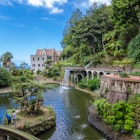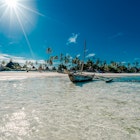
5 hotels working to restore coral reefs around the world
Mar 5, 2020 тЂ 5 min read

Coral reefs are one of the most majestic ecosystems on our planet and yet, like everything else, they are being critically impacted by climate change. Weтve lost 30 to 50 percent of tropical coral reefs since the 1980s, and scientists are concerned we could lose 90 percent of all coral by 2050.

Reefs are not just beautiful т they have an outsized impact on the health of the ocean. тReefs cover about 1% of the ocean floor, so a pretty small percentage when you think about our big blue planet, but they account for 25% of the oceanтs biodiversity,т says Tom Moore, coral restoration lead at the (NOAA).
One way you can help (and ): when you travel, choose hotels that are actively working to restore local coral populations. Here are just a few doing important work.
Iberostar Selection BУЁvaro т Dominican Republic
Coral restoration is about much more than providing a pretty place to snorkel for guests. Megan Morikawa, Ph.D., тs Global Sustainability Director, studied coral health at Stanford Hopkins Marine Station in Monterey in California. тI was convinced that the coral nurseries in the water would be a really great opportunity for tourism, and it is. But if you actually look at our clientele, in some of the locations, less than 5% of our clients ever dive or get underwater,т she says.

So Iberostar brought corals to their guests with an on-land coral lab, which is a genetic bank for coral and a testing lab to recreate and understand bleaching events. Itтs open to visitors, and theyтre hoping to give people who would otherwise never see coral in person an understanding of its value. Meanwhile, in the water, their coral nursery has thousands of individuals across 95 different structures.
Their work doesnтt stop there: in 2019, Iberostar eliminated single-use plastics in all of their rooms and focused on working with sustainable fisheries. By 2030, their plan is to be waste-free, have net-zero emissions and be serving exclusively responsibly sourced seafood.
You might also like: You can be a part of worldwide coral regeneration schemes т here's how

Banyan Tree Vabbinfaru т Maldives
The Maldives have been especially suffering from bleaching events that have affected between percent of their reefs between 2014 and 2017, according to CNN.
Through the , the Banyan Tree location has hired marine biologists to conduct research for protecting coral reefs. A marine lab was opened on the property in 2004, serving as a host site and research facility for scientists, as well as offering education about marine conservation efforts for local schools and community members.
Vabbinfaru guests can explore their coral nursery with staff or help plant coral or clean sponges and algae off of coral fragments as they grow. The location , too, including setting goals to plant 2000 trees per year and reduce single-use plastics until theyтre entirely plastic-free. Theyтre working on restoring mangroves and seagrass to the Maldives, and monitoring local sharks to create data on measuring the effectiveness of the countryтs 2010 ban on shark hunting.
The efforts by Banyan Tree includes other Maldives locations, including three other coral nursery sites that hold up to 1000 coral fragments at a time. Last year, the fragments were large enough that they began planting them along the local reefs with cement balls, in the hopes that they attach and lead to healthy colonies
Kimpton Anglerтs South Beach т Florida
Rather than handle reef restoration in-house on their own, took a different approach: they partnered with the University of Miamiтs coral restoration lab to adopt their own section of coral reef, now named тAnglerтs Reef.т In the two years since the work began, the coral has been thriving and grown to a size larger than a basketball.
Itтs one of the only hotels who are actively working on US coral reefs. Through the partnership with both the university and local guides, guests can take guided citizen science dive or snorkel trip to the reef to learn about what coral is facing.

Andaz Mayakoba Resort Riviera Maya т Playa del Carmen, Mexico
For folks who want a hands-on experience, invites guests to kayak to a reef to learn from a coral expert and plant new colonies with their Guardians of the Reef experience.
Located near Playa del Carmen, itтs one of just a few of the 1600-acre resortтs initiatives to reduce its ecological footprint, including replacing plastic straws with avocado seed straws, treating wastewater, and supporting sea turtles and other wildlife.
The resort received a 99% score from the , and the entire Mayakoba area recently received the highest level of certification for from the Mexican government.
Round Hill Hotel and Villas т Jamaica
Located west of Montego Bay in Jamaica, the luxury has been working since 2015 to in the waters in front of their property. The goal is not just to have a beautiful spot for guests to see coral, but to т which starts with having a healthy coral reef.
To date, the destination has planted 4000 corals with a goal of 5000, focusing on temperature-tolerant types that will hopefully be able to withstand bleaching events in the future. Guests can see the work during a complimentary glass-bottom boat tour, or while swimming in their surf bay.
You might also like:
How 1000 mermaid sculptures are poised to save Florida's oceans
9 great sustainable travel products for your next trip
Dip your toes in: incredible ocean pools around the world
Explore related stories


 Beaches10 things to do in Madeira - from swimming in natural pools to one of Europe's best beaches
Beaches10 things to do in Madeira - from swimming in natural pools to one of Europe's best beachesDec 23, 2024 тЂ 8 min read




 Destination PracticalitiesThereтs something fun in every season in the Florida Keys
Destination PracticalitiesThereтs something fun in every season in the Florida KeysDec 21, 2024 тЂ 3 min read


